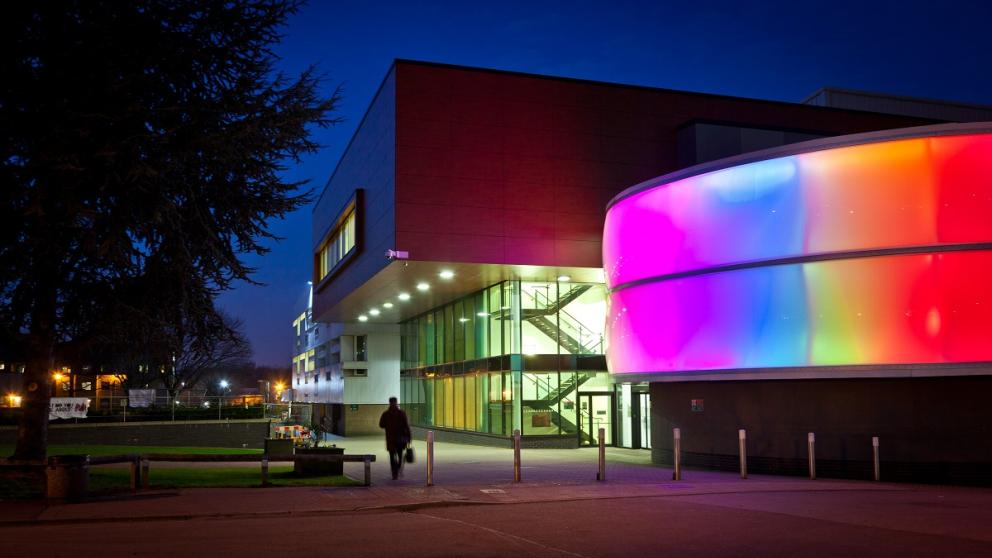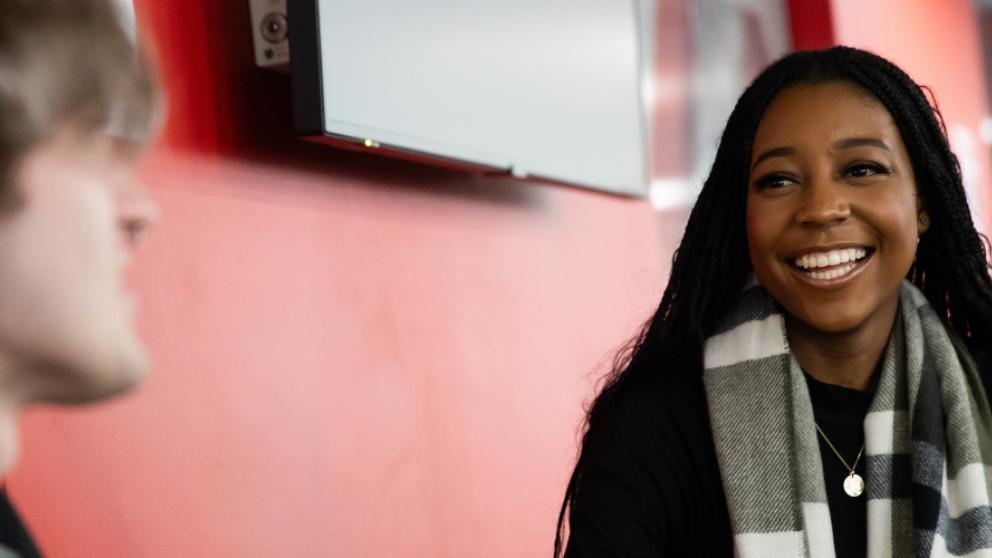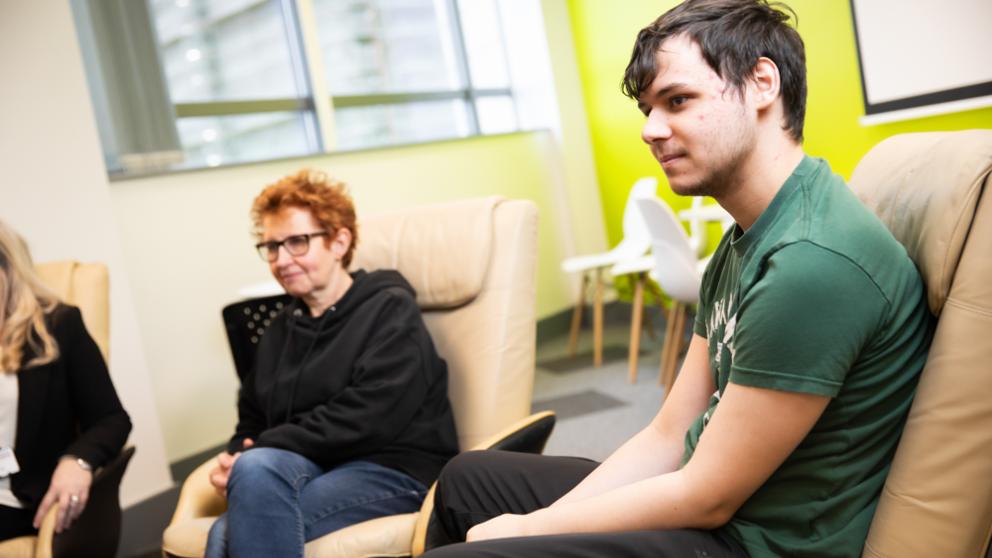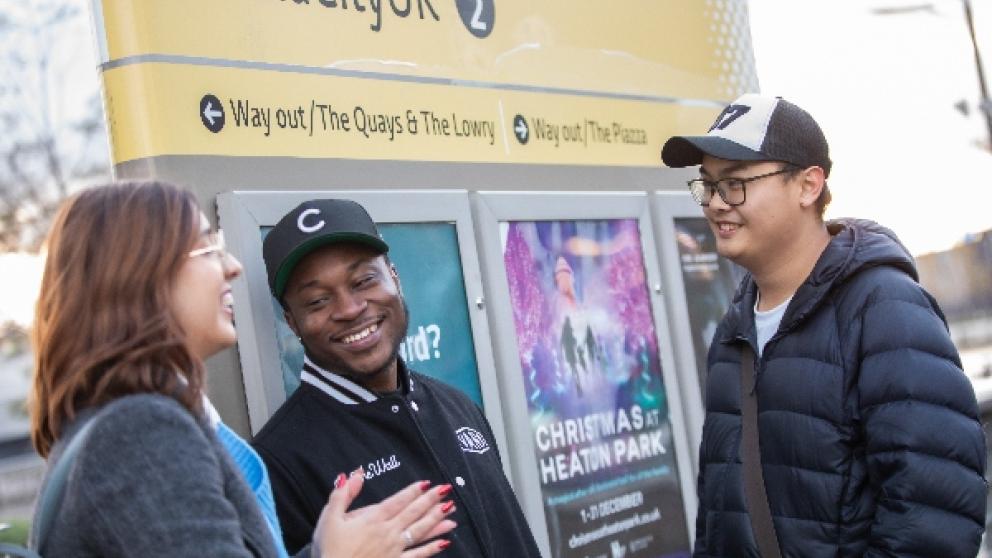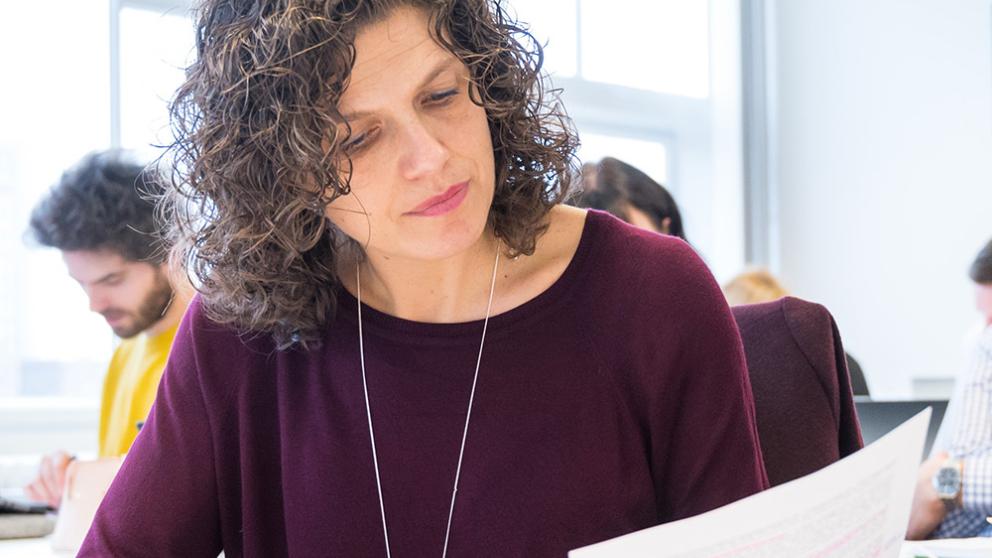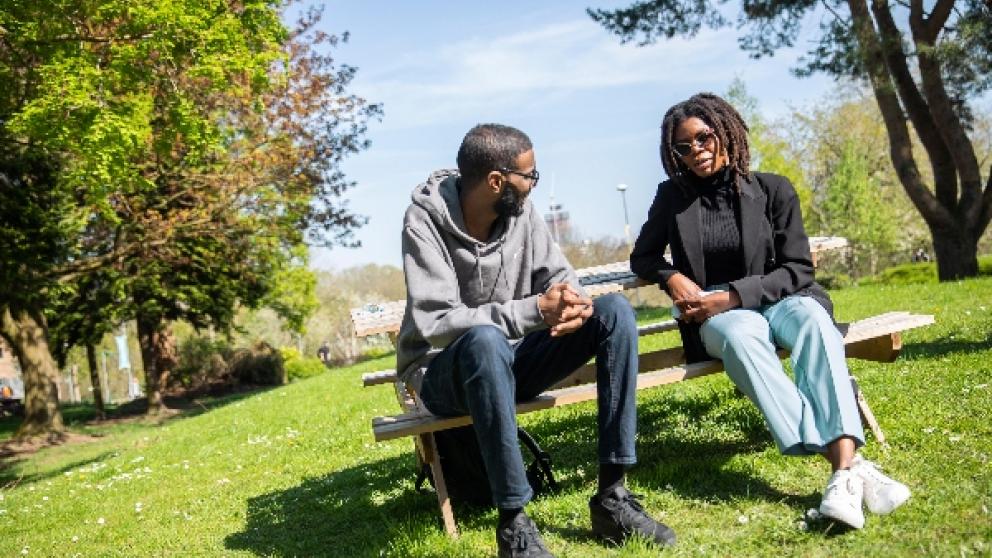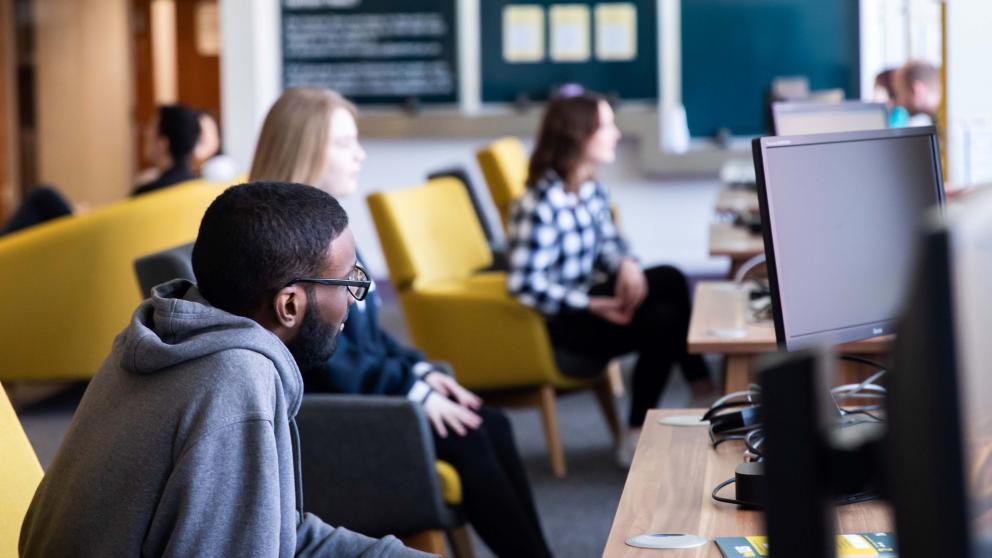Transgender Day of Visibility
On 31 March, we mark Transgender Day of Visibility (TDOV) to celebrate the lives and contributions of trans* and non-binary people within our Salford community and the wider world, while also drawing attention to the challenges transgender people are currently facing.
Explore this page to hear about Transgender Day of Visibility, learn about the support available to students and staff, and find useful resources to help you be an ally to your trans friends and peers.
*Trans is an umbrella term that includes, but is not limited to, transgender, transsexual, non-binary, gender-fluid, genderqueer etc.

Whether you're out, prefer not to be visible, or are unsure of your sexual and/or gender identity, you are welcome in our community and will be treated with dignity and respect. We're striving to be a place where you feel like you can belong.
Our Salford Proud and Trans Networks provide support, connection and influence over issues, so please join if you feel comfortable doing so, see below for more details.
Read our messages of support
We want our trans and non-binary students and staff members to feel safe and supported here at Salford. That's why we are proud to share the messages of support, encouragement, and solidarity left by our students and staff members to members of our LGBTQIA+ community, especially those who identify as trans.
On behalf of the Salford Proud Network, we would like to express our gratitude to our Trans Lead, Jae Howell, as well as the wider EDI team for their collaborative efforts in bringing this initiative to life.
A message from Professor Nic Beech, Vice-Chancellor of the University of Salford:
"In the complex dynamics of human identities, the huge benefits of diversity come from all of us being open-minded and open-hearted to learn from people who have differences to us. Diversity and learning should be our watchwords in developing our appreciation of each other and of the social challenges people face in being themselves."
''Diversity is strength. Diversity is beauty... hope, growth, possibility... thank you for being part of the Salford community. We would be less without you.''
"Never give up on fighting for yourself, who you are is good enough!"
"You are loved and supported. We can fight ignorance together with education for a fairer and kinder world.''
''No matter who you are or what you feel, know that you are always loved and wanted! ''
"My message to the LGBTQ+ community at Salford is one of hope, gratitude, and determination. As a gay man from Pakistan, I have faced deep fear and discrimination, which forced me to seek safety in the UK. I am incredibly grateful for the inclusive and supportive environment that this community offers—a place where I can be true to who I am without fear of persecution. I look forward to connecting, sharing experiences, and contributing to a community that stands for acceptance, dignity, and equality. Thank you for being a beacon of hope during these challenging times.''
"You are valid, you belong, and you are loved."
"Please know that everyone is welcome here at Salford!"
''Be proud of your identity and follow the path that makes you happy. Be proud of your community that protects you, and protect other vulnerable peers.''
"We will continue to celebrate you all and support you any way we can. Stand tall and proud."
"Please remember that whoever you are at Salford, you have the right to be here and you MATTER! There are so many of us out here cheering you on and supporting your right to exist, to be loved and to be HAPPY! We stand shoulder to shoulder with our trans* siblings and will continue to be right beside you for as long as it takes."
"I strive to be an ally, as a staff member, colleague and proud mum to a trans daughter."
"You are seen, you are wanted and you are loved members of this community."
''The world may be unkind and hateful at times, but in spite of that, love and support will always exist. You are seen, you are loved, and you are never alone.''
"I promise to stand up for this community and challenge homophobia when I see it. Belonging is for all of us!"
"Sending love to trans, non-binary and gender diverse colleagues and students. Be proud of who you are, you are enough. Don't let the challenges you may face define you: draw on the friendship and support of your allies across the University."
"Sending good vibes and support to our LGBTQ+ Community! We are here for you as allies and friends in our Salford community. "
"There is a strength in acceptance, and trans, non-binary and gender diverse people need that now more than ever. So be kind, to yourself and others."
"Every individual deserves to feel valued and respected for who they are. I'm committed to fostering an inclusive environment where everyone can thrive authentically. Let's continue to celebrate diversity and stand together as allies."
"The world is always a better place with more non-conformity, diversity, and people living their truth. I have found campus to be a welcoming and supportive place, with lots of people eager to share, learn, support - and maybe even feel a little bit of queer joy, I hope you do too!"
"Aged 50+ mature student here who knows trans women are women, trans men are men and trans rights are human rights."
"It’s a journey for many to discover their true identity. I’m thrilled that you’ve found your authentic self and are embracing life! Truly inspirational!"
"The huge benefits of diversity come from all of us being open-minded and open-hearted to learn from people who have differences to us. Diversity and learning should be our watchwords in developing our appreciation of each other and of the social challenges people face in being themselves."
Find your community
Whether you're looking for a group of like-minded friends or a supportive listening ear, there are LGBTQIA+ groups within the University and wider community that you can join.
Salford Proud
Open to all members of staff and postgraduate students, whether you identify as LGBTQ+ or not, Salford Proud is here to support members of the LGBTQ+ community at the University, raise awareness of LGBTQ+ issues and make sure that LGBTQ+ experiences are at the forefront of discussions when implementing change.
LGBTQ+ Society
Bringing together LGBTQ+ students at the University of Salford, the LGBTQ+ Society aims to create a social environment which is safe, fun and informal through weekly meetings and events throughout the year to meet like-minded LGBTQ+ people and allies.
Find local groups
If you need some local support, or to find your community outside the University, the LGBT Foundation can help. Check out their list of trans groups in Greater Manchester.
Support for trans students
If you identify as trans or non-binary, or are questioning your gender identity, there are lots of ways we can support you to make sure you feel safe and comfortable while you study.
Learning from other trans+ students is a helpful way to receive guidance and advice. Explore the Life as a trans+ student website to hear about lived experiences at university.
Support for trans students
Specialist Support
For students who identify as trans or non-binary, we offer support to create a safe and welcome environment that is inclusive of your gender identity and expression. If you wish to go through any form of transition at university, we can support you by changing names, gender, pronouns, titles, referring you to external and internal specialist support etc at the speed that you feel comfortable with. We can also put you in contact with other trans and non-binary students.
Visit our webpage to learn what support is available from our specialist advisers and how to get involved in groups like our Salford Trans and Non-Binary Forum and Trans Peer Support Group.
Report It
Homophobia and transphobia are never OK. If you experience (or witness) concerning behaviour, let us know via Report It to ensure you, or the person affected, are supported and to help prevent things like this from happening in the future.
This is a safe and confidential way to report a hate crime and is handled by our expert Respect, Cultures & Behavior team. It's not an official report but if you do want to report it officially, the team can support you with this. You can also report anonymously but by not providing your name or contact details we cannot offer you support or take action against your report. However, it will allow us to identify any emerging issues we need to respond to.
Health Centre
While most health issues affecting LGBTQIA+ individuals are similar to those of the general population, we know that LGBTQIA+ people have unique health needs and can experience disparities in care. In 2018, our Health Centre was awarded a Gold standard for ‘excellence in LGBT healthcare’ through LGBT Foundation’s Pride in Practice quality assurance scheme which trains and accredits GP practices for ongoing support of lesbian, gay, bisexual and trans patients.
Support we offer:
- Bridging prescriptions* after consultation with one of the GPs
- Changing your gender assigned at birth on your medical record after a discussion with a GP
- Changing your name and prefix in your medical record without Gender Recognition Certificate or Deed Poll
- Referrals to Gender Identity Clinics
- Referrals for gamete storage, I.E. freezing your sperm or eggs, to be used at a later date
- Support with administering injectables and teaching safe self-injection
Visit the Health Centre's webpage for full details
*A bridging prescription is a temporary prescription of hormone replacement therapy (HRT), issued by a GP to a patient who is waiting for specialist treatment.
Wellbeing and Counselling
There may be times at university when you need to speak to someone because you need support with a personal issue, or you need someone to listen. It may be a worry that you feel like you can’t discuss with your friends, family or tutor.
If you would like to talk through your worries in a confidential setting, our Wellbeing and Counselling team are here for you. Book an appointment with one of our Wellbeing Advisers to talk it over or be supported and referred to more acute mental health services where appropriate. This service also runs a group session for trans students.
Helpful resources
Want to learn more about the experiences of your trans friends and peers? Reading queer* books or watching queer media not only helps queer people to see themselves, but also helps others see, understand, and empathize with the experiences of queer people.
We asked members of our Salford community to share their top LGBTQIA+ recommendations and compiled them to create our LGBTQIA+ Masterlist: a resource from the people of Salford, for the people of Salford (and beyond!), sharing the most important queer texts for the next generation. Here's just a few.
- Pose (2018-2021 TV series)
"It is amazing to see the trans community represented in an unwavering light of courage in Pose. Especially in this time of unrest. It gives me hope that no matter what life throws at us, we will always close ranks and push forward for those that come after us." - Pride (2014 film)
"As a trans woman, it's important to me to learn about the past of the culture I belong to. [This film is] the legacy passed down to me and my generation, like a family whose ancestors echo through us. Learn your history - cause you can be sure it isn't gonna be in your Year 7 history textbooks." - Out of the Shadows, Walt Odets (2020 book)
"[This book] reminds me of the richness of queer history, the suffering, the humour and the hope. That by living different lives we can see and experience the world differently. In an age increasingly obsessed with targets, algorithms and homogeneity queer people have so much to offer."
*We understand that the word 'queer' carries a complex history and has caused harm and exclusion in the past. However, we also recognise the power of reclamation and reappropriation. For many LGBTQIA+ individuals, 'queer' represents a badge of honour, a statement of visibility, and a demand for inclusion.
We use the term 'queer' with respect and love, while acknowledging that not everyone within the LGBTQIA+ community identifies with this term, and we respect their individual choices in self-identification. 'Queer' is a word that allows us to be inclusive, encompassing the rich diversity of sexual orientations and gender identities that may not fit exclusively within the cisgender or heterosexual categories. Terms evolve and meanings shift, and it's crucial to consider the historical and personal significance of the word 'queer.' Together, we aim to use 'queer' as a symbol of representation and empowerment.

